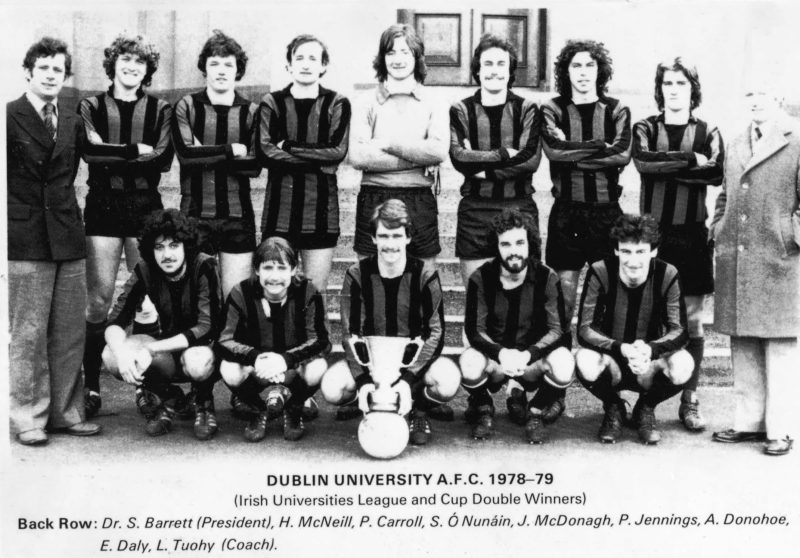Trinity and Dublin University Association Football Club (DUAFC) are set to host the 2020 FAI Collingwood Cup later this academic year. Running since 1914, the prestigious intervarsity competition invites both Republic of Ireland and Northern Ireland’s universities to compete against each other every February – and to secure the bragging rights among college rivalries. Matches will be held in a variety of Trinity’s locations, such as College Park, Santry and the Iveagh Grounds.
This year will be the 100th edition of the cup – and it could be its last. Speaking to The University Times, Richie Maguire, DUAFC’s manager, says that this might be the last Collingwood Cup, due to proposals to reform and expand the competition. Maguire also says that talks between the Universities and the Football Association of Ireland (FAI) are still ongoing and nothing concrete has been finalised in terms of the cup’s future.
“There’s a big push from the FAI for the Colleges and Universities to combine”, he says. “So we would have a new and bigger competition. So if that goes ahead, next year there won’t be another Collingwood Cup. Depending on what happens.”
A cup run could do DUAFC a world of good for their morale. The men in red and black will have the luxury of being automatic quarter-finalists as hosts – along with the introduction of a seeding system. This may work out in Trinity’s favour as it will mean they will not face any of the stronger teams – like University College Dublin, University College Cork or Queen’s University – in their opening fixture. After last year’s disappointing and controversial exit to Maynooth University in the last 16, Trinity will be hoping to bounce back and assert themselves as strong hosts.
In Maguire’s three-year tenure at the club, DUAFC’s league success has not been matched in its cup campaigns. In the last few years, the closest they’ve come to success was a quarter-final finish in 2017, and in the last two years they’ve hardly made a mark.
But before that, they reached the final, under the stewardship of Adrian Fitzpatrick, a former coach of the club who resigned in acrimonious circumstances over the conditions of the facilities the club had access to.
This is the first year that I believe the students have the ability to compete at this level
But that’s all in the past now, and there’s a sense in Maguire’s voice that this year is different. Although his main objective is to rack up points in the league, harvesting more playing time and experience for the student-based team is something that is crucial to him for his approach for the Collingwood Cup. Maguire’s long-term philosophy, it seems, is to use the tough and rugged nature of his side’s regular Sunday league to get his players battle-hardened in preparation for the Collingwood.
“The league is quite physical”, Maguire says frankly. “It’s tough. It’s the second-highest level below the League of Ireland. But what we have now is a student team that is good enough to compete. I’ve always felt that the team should always be an all student-based team. I feel like it’s their time.”
“Unfortunately, in recent years we wouldn’t have been able to compete in the leagues we were in with an all-student team”, he adds. “But this is the first year that I believe the students have the ability to compete at this level.”
DUAFC have only ever won the Collingwood twice – in 1967 and in 1979. The 1967 team are of particular note as the victory took place on home soil, in Trinity. DUAFC had a comfortable route to the final – they thrashed the Royal College of Surgeons 9-0 in the quarter-final before seeing off University College Galway 2-0 in the semis. Past match reports describe the Galway side’s style of play as “void of skill, all hit and hope and guaranteed to spoil any skill that the opposition has”.
But DUAFC faced much tougher opposition in the shape of Queens University in the final, and the game was decided in dramatic circumstances: in the last five minutes, Trinity’s John Reaney was tackled in the box, allowing the in-form Andy Nono to step up to the spot and place the ball past the keeper to secure the trophy for the hosts in the comforting surroundings of College Park.
I’ve always felt that the team should always be an all student-based team
Come February, this year’s team will be also hoping for just as dramatic and romantic a way to win the competition. The success of the 1967 players was celebrated two years ago with a reunion of the 1967 team – to celebrate the 50-year anniversary of their victory.
Before 2015, the last time Trinity came near to victory was in 2002. After a 0-0 game could not be settled after extra-time, University College Cork (UCC) edged home victory on penalties, winning 7-6.
Maguire recalls of a “golden generation” of players DUAFC had in the last five years – including Aymen Ben Mohamed, who plays for Esperance Sportive de Tunis, one of the biggest clubs in Tunisia. But Maguire insists that although Mohamed’s era was something special, he believes his current squad have the potential to do big things this year.
UCC are also the current holders of the title, having defeated University Limerick 2-1 in the 2019 final in Markets Field. This was UCC’s 14th time as champions.
DUAFC will be hopeful that hosting the tournament can help them gain a psychological advantage over their rivals. Strong crowds are a prevalent sight at College Park for even the smallest of games. With the chance to win silverware on home soil, Trinity men’s will be determined to leave their mark on the same pitches they sink their boots into every week.







